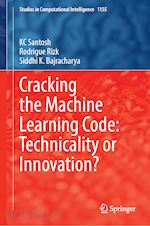
Questo prodotto usufruisce delle SPEDIZIONI GRATIS
selezionando l'opzione Corriere Veloce in fase di ordine.
Pagabile anche con Carta della cultura giovani e del merito, 18App Bonus Cultura e Carta del Docente
Employing off-the-shelf machine learning models is not an innovation. The journey through technicalities and innovation in the machine learning field is ongoing, and we hope this book serves as a compass, guiding the readers through the evolving landscape of artificial intelligence. It typically includes model selection, parameter tuning and optimization, use of pre-trained models and transfer learning, right use of limited data, model interpretability and explainability, feature engineering and autoML robustness and security, and computational cost – efficiency and scalability. Innovation in building machine learning models involves a continuous cycle of exploration, experimentation, and improvement, with a focus on pushing the boundaries of what is achievable while considering ethical implications and real-world applicability. The book is aimed at providing a clear guidance that one should not be limited to building pre-trained models to solve problems using the off-the-self basic building blocks. With primarily three different data types: numerical, textual, and image data, we offer practical applications such as predictive analysis for finance and housing, text mining from media/news, and abnormality screening for medical imaging informatics. To facilitate comprehension and reproducibility, authors offer GitHub source code encompassing fundamental components and advanced machine learning tools.
Chapter 1. Introduction.- Chapter 2. Data modalities and preprocessing.- Chapter 3. Basic building blocks: From shallow to deep.- Chapter 4. Experimental Setup.- Chapter 5: Case study: from numbers to images.- Chapter 6: Extension: Multimodal learning representation.- Chapter 7. Where is the innovation?.
Prof. KC Santosh—a highly accomplished AI expert—is the chair of the Department of Computer Science and the founding director of the Applied AI Research Lab at the University of South Dakota. He is also served the National Institutes of Health as a research fellow and LORIA Research Center as a postdoctoral research scientist, in collaboration with industrial partner, ITESOFT, France. He earned his Ph.D. in Computer Science—Artificial Intelligence from INRIA Nancy Grand East Research Center (France). With funding exceeding $2 million from sources like DOD, NSF, and SDBOR, he has authored 10 books and over 250 peer-reviewed research articles, including IEEE TPAMI. He serves as an associate editor for esteemed journals such as IEEE Transactions on AI, Int. J of Machine Learning & Cybernetics, and Int. J of Pattern Recognition & Artificial Intelligence. He, founder of AI programs at USD, has significantly boosted graduate enrollment by over 3,000% in just three years, establishing USD as a leader in AI within South Dakota.
Dr. Rodrigue Rizk is an assistant professor at the University of South Dakota, holding a B.E. degree in computer and communication engineering with Summa Cum Laude highest honor distinction from Notre Dame University. He earned both his M.S. and Ph.D. degrees in Computer Engineering from the University of Louisiana at Lafayette, maintaining 4.0 GPA. Specializing in the dynamic interplay between software and hardware, his research interests span high-level computational systems, artificial intelligence, quantum computing, and more. He is a licensed professional engineer, a member of the Order of the Engineer, and holds various accolades, including the Richard G. and Mary B. Neiheisel endowed fellowship. He is a lifetime member of the Phi Kappa Phi honor society and a professional member of ACM and IEEE. His contributions have earned him numerous awards, including the President’s Award for Educational Excellence and Outstanding Academic Achievement.
Mr. Siddhi K Bajracharya is a research fellow for the Applied AI Research Lab, Department of Computer Science at the University of South Dakota. His research study focuses on building generic and/or generalized machine learning models for multiple data types: numbers, texts, and images.











Il sito utilizza cookie ed altri strumenti di tracciamento che raccolgono informazioni dal dispositivo dell’utente. Oltre ai cookie tecnici ed analitici aggregati, strettamente necessari per il funzionamento di questo sito web, previo consenso dell’utente possono essere installati cookie di profilazione e marketing e cookie dei social media. Cliccando su “Accetto tutti i cookie” saranno attivate tutte le categorie di cookie. Per accettare solo deterninate categorie di cookie, cliccare invece su “Impostazioni cookie”. Chiudendo il banner o continuando a navigare saranno installati solo cookie tecnici. Per maggiori dettagli, consultare la Cookie Policy.